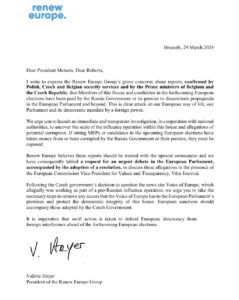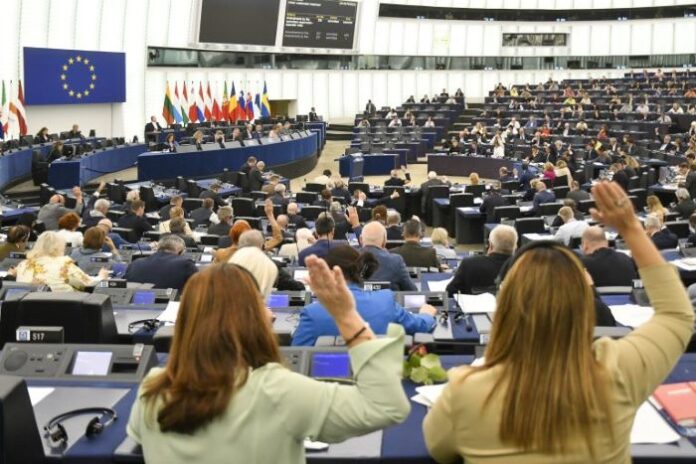Last week, just over two months before the European elections, a new scandal emerged regarding Russian interference in European Union politics. This time, some members of the European Parliament were involved. Investigations in several member states, including the Czech Republic, Poland, and Belgium, found that a network centred around the Voice of Europe website was spreading disinformation to promote the Putin regime’s interests. The most concerning fact is that, according to the findings, the Russian side paid MEPs to spread fake news on Ukraine. The investigations revealed that some European politicians from Belgium, France, Germany, Hungary, the Netherlands, and Poland collaborated with the site paid with Russian funds. Moscow also used funds to finance campaigns for the upcoming European elections.
On March 28, Belgian Prime Minister Alexander De Croo stated that “Russia approached EU lawmakers” and paid them to “promote Russian propaganda” in Europe in an operation uncovered by a Czech investigation.
Czech Prime Minister Petr Fiala revealed that other European countries had opened investigations following the Czech Republic’s efforts and that the uncovered operation aimed to destabilise Europe. The Polish side also made public the results of an investigation.
“We can’t afford to be a step back behind Putin. He influences most of #elections in EU. While not surprising, what is significant is confirmation by intelligence services of what Kremlin is doing,” Vice-President and Commissioner for Values and Transparency Věra Jourová posted on X.
On March 29, Valérie Hayer, the President of Renew Group, sent a letter to Roberta Metsola, the President of the European Parliament. In the letter, Hayer requested an urgent debate and resolution on the allegations in the presence of Commissioner Věra Jourová. This debate is set to take place during the next parliamentary plenary session on April 10th and 11th in Brussels. The EPP, S&Ds, and Greens groups also agreed with such a request.
The EU reacts
The annexation of the Crimea peninsula by Russia in 2014 revealed that Russian propaganda had created deep roots in the EU member states. Several politicians hesitated in condemning the Russian invasion, while some governments opposed the sanctions the EU imposed on Russia. In addition, many MEPs travelled to Crimea to express their support for the Moscow regime.
However, in 2014, the issue of Russian interference in EU member state domestic policies was neglected by many in the European political sphere. Also, the EU should have taken adequate measures against Russian activities during the 2019 European elections. Nevertheless, some MEPs, national politicians, and journalists acted as Russian agents, spreading disinformation unbothered.
It was after the invasion of Ukraine that European political leadership realised the threat the regime of Vladimir Putin represents for the future of Europe. If Russia wins in Ukraine, then nobody will be safe in Europe. Sweden and Finland, traditionally neutral states, realised this and became NATO members.
Russia’s disinformation in Europe varies. Kremlin deployed a wide range of narratives: the alleged Nazi regime of Kyiv, Russia’s encirclement by NATO, that the West and the EU are tiered helping Ukraine and are sceptical about continuing to support Kyiv.
In November 2023, the European Union’s institutions reached a consensus on a new set of rules regarding political advertising. These rules prohibit foreign entities from sponsoring ads before an election or referendum.
In February, the European Parliament adopted a resolution raising concerns over Russia’s interference in the EU’s democratic processes, which was observed through traditional and social media outlets. The resolution called on the European Commission to take swift measures to prevent foreign interference within the bloc.
As part of the Defense of Democracy package, the Commission is working on a foreign agent registry bill. The bill will require all foreign-funded organisations that conduct interest actions to sign up for an EU-wide transparency register.
The Belgian prime minister confirms
Belgium’s Prime Minister, Alexander De Croo, disclosed on Thursday that Russian officials paid European Union lawmakers to promote Russian propaganda in Europe.
The revelation was made known during a debate on foreign interference in the Belgian Parliament. De Croo confirmed that the Czech secret service had notified Belgian intelligence services about the allegations regarding some MEPs.
According to reports, far-right Vlaams Belang politicians were also mentioned, but unlike some German and Dutch MEPs, there is no evidence that they received payment.
Czech revelations
Czech media reports suggest intelligence officials investigated allegations involving politicians from several European countries, including Germany, France, Poland, Belgium, the Netherlands, and Hungary.
The focus of the investigation is an information company called Voice of Europe, which was recently sanctioned by the Czech Republic along with two individuals. Viktor Medvedchuk, a pro-Kremlin Ukrainian politician, is one of the sanctioned individuals. According to the Czech Foreign Ministry, Medvedchuk used Voice of Europe to spread propaganda aimed at undermining Ukraine’s territorial integrity, sovereignty, and independence.
“We uncovered a pro-Russian network that was developing an operation to spread Russian influence and undermine security across Europe. We have therefore added two individuals and one legal entity to the sanctions list, and the domestic authorities have subsequently secured their assets,” Prime Minister Petr Fiala posted on X.
“The Czech Republic was at the beginning of this whole event. Our work and efforts led to other European countries investigating the activities of pro-Russian espionage networks and are gradually coming to other severe findings. One of them, for example, was published today by Poland. Steps in other states will follow.
These are sensitive matters, so you will surely understand that I cannot share many details. But I want to underline one thing. The steps we have taken in the last two days are the result of international cooperation, which we started and which we are successfully coordinating.
I am proud that we are the ones who showed the strength and ability to make timely and good decisions. We do what it takes,” Fiala wrote.
The Polish investigation
During the farmers’ demonstrations in Poland last February and early March, photos appeared in the media showing tractors with Russian flags and a banner glorifying Putin. The banner, alongside a Soviet flag, read: “Putin—Put Ukraine, Brussels and our rulers in order.” It appeared at a demonstration on a motorway near the village of Gorzyczki, not far from the Czech border.
On March 29, 2024, the Internal Security Agency (ABW) carried out a large operation in Poland to dismantle a Russian spy network operating in the country. The network acted to counteract the European Union and its bodies. During the searches, ABW agents seized EUR 48,500 and USD 36,000.
The operation revealed that the network was organising initiatives and media campaigns for the Kremlin, including disinformation activities against Poland and Ukraine, and aimed to weaken the EU’s position. The investigations also revealed that the network had launched an international internet portal that published articles, statements, comments, and interviews with a pro-Russian tone. This portal impacted the ongoing international situation, including Russia’s war against Ukraine.
The ABW branch in Olsztyn is conducting preparatory proceedings, and the branch in Białystok is supervising the investigations, led by the Warsaw Mazovian department of the Department for Organised Crime and Corruption of the National Prosecutor’s Office.
Polish authorities consider these activities crucial for the country’s security.
In addition, the far-right party Konfederacja, also an ID partner, spreads anti-Ukrainian propaganda aiming to change public opinion’s solidarity sentiments towards Ukraine.
Russian disinformation hits the EU Parliament
As the European Parliament elections approach, political groups demand action to protect the institutions.
In a letter to Metsola, Hayer wrote:
“Dear President Metsola, Dear Roberta,
I write to express the Renew Europe Group’s grave concerns about reports, confirmed by Polish, Check and Belgian security services and by the Prime ministers of Belgium and the Czech Republic, that Members of this House and candidates in the forthcoming European elections have been paid by the Russia Government or its proxies to disseminate propaganda in the European Parliament and beyond. This is a clear attack on our European way of life, our Parliament and its democratic mandate by a foreign power.”
Hayer urged the EP President to “launch an immediate and transparent investigation, in cooperation with national authorities, to uncover the scale of the influence operation” within the Parliament.
“If sitting MEPs or candidates in the upcoming European elections have taken money from or been corrupted by the Russian government or their proxies, they must be exposed,” she wrote.
“It is imperative that swift action is taken to defend European democracy from foreign interference ahead of the forthcoming European elections,” Hayer concluded.

The EPP and the S&Ds had immediate reactions.
“Following revelations of Russian interference in Europe, the EPP Group calls for an urgent plenary debate in the European Parliament. The EPP stands firmly against Putin’s misinformation and propaganda, and the danger he poses to our democracy must be exposed at all levels,” the EPP declared in a press release.
“Following new allegations of Russian interference in the European Parliament and upcoming EU elections, the S&D Group is calling for an urgent plenary debate. We are determined to protect our democracies from those who seek to spread lies and divide us,” S&D said.
The ECR, Greens, Left, and ID groups had not made public statements by the time of publication.
Is the far-right only involved?
The investigations indicated that Russian officials corrupted some German and Dutch parliamentarians. The names mentioned by the press include Maximilian Krah, the leader of the German far-right party Alternative für Deutschland (AfD) for the European elections. In February, he told Voice Of Europe that the Americans are responsible for the attacks on the Nordstream pipeline. Krah denied that he received any payment for his interviews. Dutch MEP Marcel de Graaff, a former member of the Geert Wilders‘ party and, since 2022, MEP for the Forum for Democracy (FvD), caused a scandal in the European Parliament earlier in March after he launched the conspiracy theory that Ukraine is the largest supplier of children for “pedo networks, human smuggling and organ trafficking”. Reacting to these allegations, some MEPs asked the President to investigate him. He also denied any payment received from the Voice of Europe. The list includes MEPs from the Vlaams Belang far-right party of Belgium. Also, an MEP from the ECR member VOX (Spain) participated in a debate organised by the Voice of Europe at the European Parliament in Strasbourg.
Why EU resilience to Russian disinformation matters
For a long time, Russia has sought the destabilisation of several EU member states and of the Union in general. The Kremlin controls an army of politicians – mainly among the far-right, some leftist parties, and journalists. Moscow interfered in several cases seeking to increase national crises, such as the Catalan independence and the agreement between Greece and FYROM – which resulted in Greece’s recognition of the Republic of Macedonia – or the recognition of Kosovo by all EU member states.
After Ukraine’s invasion, even the most sceptics among the European democratic political parties realised that the Putin regime represents a real and active political, economic and military threat to the entire of Europe.
The fact that third countries pay MEPs to make lobbying is not new. The most recent was the Qatar scandal.
However, Russia is an enemy trying to bring chaos to our continent. Increasing the EU’s resilience to the Kremlin’s attacks is essential for our future.

